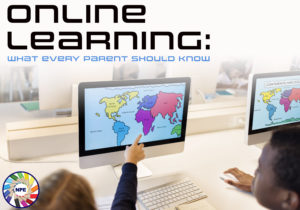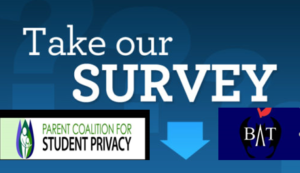Update (2/12/18): The survey results of Indiana PA public school parents were released and the reveal even more negative views of the Summit learning platform (SLP) than expressed by their kids: “Parents/guardians generally agreed that SLP does not encourage or helps students learn. Additionally, most did not feel that SLP helps students be creative, prepares them for future education or future careers, helps them think critically or problem solve, helps them socialize or prepare them for future social situations, or strengthens the school community.” More than 72% of parents do not want the Summit platform used at all at their schools next year or that it should be made fully optional. Also, Indiana PA parents have posted a new website about their concerns.
Mark Zuckerberg recently posted a letter called Lessons in  Philanthropy 2017 in which he recounted what he had learned over the last few years, and explained which education initiatives his LLC, the Chan Zuckerberg Initiative (CZI) would focus upon in the future.
Philanthropy 2017 in which he recounted what he had learned over the last few years, and explained which education initiatives his LLC, the Chan Zuckerberg Initiative (CZI) would focus upon in the future.
The letter evinced no awareness of how his reputation and that of Facebook have been seriously tarnished in recent months, involving ongoing violations of privacy, the practice of hosting racially discriminatory ads as well as political ads bought by Russians in an apparent effort to undermine our elections. Increasingly, commentators have recognized how despite its name, Facebook is a faceless corporation, which operates through profit-making motivations and unaccountable algorithms, without the empathy or wisdom that only human agency can provide.
Nor did Zuckerberg’s words show any trace of humility, given how a large share of his earlier $100 million “investment’ in the Newark school system was diverted to politically-connected consultants and appears to have had few positive results for students. Instead, he focused on how his LLC will transform education through the “magic of technology.” Speaking of himself in the third person, he wrote:
The magic of technology is that it can help social change scale faster. And because of Mark’s experience building a world-class engineering organization at Facebook, we are in a unique position to build a philanthropy with a great engineering team to help our partners scale their social change faster as well.
One challenge we’ve seen in education is that there are many brilliant teachers and school leaders who create new kinds of schools based on new models of learning — but those schools usually only serve hundreds of students, while most children still do not have access to them. There are very few examples of new school models that expand to thousands of schools today.
Our hope is that technology can help with this scaling challenge. We’re seeing promising signs of early success, where our partnership with Summit Public Schools has helped encode their teaching philosophy in tools that will be used in more than 300 district, charter, and private schools this fall.
Zuckerberg went on to discuss the research of Benjamin Bloom – which “suggests we need an education system where all students receive the equivalent of an expert one-on-one tutor” but then assumed that online platforms can substitute for the close feedback of human tutors.
I have written about the Summit’s learning system before, in articles exploring the lack of data privacy afforded students in using the platform, their negative experiences of spending hours per day on computers, and most recently, my disappointing visit to a Summit charter school and the lack of any research showing positive results.
According to a CREDO 2017 analysis , Summit charter students showed no significant gain in reading compared to similar students at public schools, and exhibited a small but significantly negative effect in math. The most recent Gates-funded RAND analysis of Next Generation Learning schools, of which Summit is a prime example, concluded there were small and mostly insignificant gains in achievement at these schools, and students were more likely to feel alienated and unsafe compared to matched students at public schools. The overall results caused John Pane, the lead RAND researcher, to say to Ed Week that “the evidence base [for these schools] is very weak at this point. ”
Yet Summit’s mediocre academic and survey responses have not dampened the enthusiasm of its promoters, including Zuckerberg or Bill Gates. Gates continues to express support for Summit’s online platform, and in June, his foundation granted $10 million to Summit to “support implementation of the Summit Learning program in targeted geographies.” Lauren Powell-Jobs awarded Summit another $10 million to create a new Oakland high school. Finally, Betsy DeVos, the fourth member of this exclusive club, provided Diane Taverner, the founder of Summit, a prime speaking slot at her recent forum on “Rethinking schools.”
CZI’s education program is now headed by James Shelton, following stints at Exxon, McKinsey, various technology companies, the New Schools Venture Fund, the Gates Foundation, the US Department of Education, and most recently, a company called U2, for which he portrayed as “helping universities become better digital versions of themselves.” (In LinkedIn, he describes himself as a “Tri-sector Operator, Investor & Entrepreneur.”)
Last month in a blog post, Shelton wrote that his goal at CZI would be to provide disadvantaged children with the sort of personalized education that privileged children receive – the “kind of focus on individual needs and support that define privilege and make it available to all.” Yet in a sort of shell game, CZI seems intent on promoting a mere simulacrum of individual attention for underserved children, rather than the sustained and concentrated human support afforded students in small classes at private or wealthy suburban schools.
Meanwhile, parents whose children have been subjected to the Summit platform are pushing back in at least seven states and have seen some success. Parents in Cheshire, Connecticut posted a petition protesting the use of the program, criticized its low-quality at school board meetings, and finally persuaded the Superintendent last month to suspend the program midyear. They cited the platform’s demoralizing effect on their children, the lack of teacher feedback, the risks to their privacy, and the haphazard quality of the online curriculum, including a reference to bestiality in one of the modules.
Just days later, it was reported that the Indiana Area school board in Pennsylvania ordered “a rollback” of the Summit program mid-year because of similar complaints from parents about its negative impact on their kids. The district announced it will immediately drop the platform in two core subjects, and next year will allow parents to opt their children out of it entirely.
A subsequent survey of middle school students in the Indiana Area district using the online platform found that 39 percent said the Summit learning platform (SLP) should not be used at all, and another 31 percent said that it should be made fully optional. The largest percentages of students found the platform annoying, frustrating, stressful and boring.
As the researchers summarized the results, “most did not feel that SLP helps students be creative, prepares them for future education or future careers, helps them think critically or problem solve, helps them socialize or prepare them for future social situations, or strengthens the school community.” They also found that students “expressed a desire to spend less time on screens, and critiques of screen time often overlapped with critiques of SLP as a platform and teacher.”
Petitions opposing the use of the Summit platform have now been posted by parents in Fairview Park City in Ohio and in New Egypt, New Jersey.
As others have noted, this pattern of events seems similar to what occurred on a larger scale in the inception and ultimate collapse of inBloom, the Gates-funded $100 million online data-collection corporation that closed its doors nearly four years ago, because of parent anger at the risk it posed to their children’s privacy and its lack of proven benefits.
Just as the Gates Foundation used its vast resources to pay for the travel of state and district administrators for briefings and promised financial incentives of various kinds, so has the Zuckerberg millions enabled Summit to fly “the Cheshire administrative team to Oakland, California, for training and provided the district with 130 Chromebook computers,” according to the Associated Press. (See Natasha Singer’s series called “Education Disrupted” in the New York Times, about how Silicon Valley corporations have successfully infiltrated the classroom using similar strategies.)
Like Cheshire’s sudden suspension of Summit, Louisiana State Superintendent John White pulled student data out of inBloom’s cloud in mid-year, after parent protests broke out and the opposition of state school board members emerged, who had not been told in advance of its implementation. A few months later, Jefferson County Superintendent Cyndy Stevenson in Colorado announced that inBloom’s data collection would be made optional for students, and that she would leave this decision in their parents’ hands, just as has now occurred in Indiana, PA.
Yet this concession didn’t work to quiet the storm. As Rachael Stickland, a leader of the inBloom opposition in JeffCo recounts, “The board had hoped the promise of ‘opting out’ would calm down parents and relieve the pressure. It didn’t. We kept pushing. Ultimately, it became a political hot potato and they had to vote it out.”
But the greatest similarity to the inBloom controversy is how Summit has led to its supporters to express the same sort of condescension towards parents, claiming that their opposition is based on unwarranted fear and confusion. The Cheshire Superintendent blamed disaffection with Summit on “a substantial degree of misunderstanding and misinformation within the community.” Monica Bulger, a researcher at the Microsoft-backed Data and Society Institute, explained the parent pushback this way: “”There’s a powerful fear narrative happening” and that “We don’t necessarily want school content by popular vote.”
Bulger was one of the co-authors of a report released last year on the failure of inBloom, in which the vast majority of those interviewed and quoted supported and/or worked for this massive data-mining project. Several reviewers of the report, including Audrey Watters and Peter Greene, noted its evident bias and the way in which the authors assumed the unproven value of inBloom’s data-collection while dismissing legitimate parental concerns.
Bulger and her co-authors repeatedly suggested that parents’ rejection of inBloom was “irrational,” even as the project’s explicit purpose was to accelerate the collection and dispersal of their children’s personal information to a wide number of for-profit ed tech companies, and to encourage them to build their products around the data. As Watters wrote,
This juxtaposition of parents as “emotional” and inBloom and the project’s supporters as “scientific” and “technical” runs throughout the report, which really serves to undermine and belittle the fears of inBloom opponents. (This was also evident in many media reports at the time of inBloom’s demise that tended to describe parents as “hysterical” or that patronized them by contending the issues were “understandably obscure to the average PTA mom.”) The opposition to inBloom is described in the Data & Society report as a “visceral, fervently negative response to student data collection,” for example, while the data collection itself is repeatedly framed in terms of its “great promise.”
We see this strategy repeated once again among Summit’s defenders, who portray parental apprehensions as uninformed, even as they provide no independent evidence of the program’s benefits and growing evidence of its harm. The ed tech industry and the insistence of its devotees on patronizing parents and depicting their desire to have a voice in how their children are educated lacks any acknowledgement about the way in which venture philanthropists have used their wealth to circumvent democracy, with the goal of privatizing, standardizing and mechanizing education and student data.
Last year Mark Zuckerberg wrote, “We’ll build technology where it can help, and we believe in listening to and working closely with parents, teachers and students to understand the specific needs of the communities we’re working in.” In 2018, perhaps Zuckerberg, Gates and the other data overlords and their vassals should start making a real effort to listen to parents and communities, rather than belittle their concerns and try to force-feed their autocratic and technocratic model of education on children.
But I’m not holding my breath. In November, the Alt School, a Zuckerberg-funded chain of private schools using instructional technology announced it would close at least three of its seven schools. Yet rather than learn the obvious lessons from the observations of disappointed parents who pulled their kids of these schools, the Alt School CEO now says he will focus on marketing their software to public schools. Clearly, parents will have to continue their battle to preserve classrooms focused on human interaction, discussion and debate rather than machine-centered reductionist forms of education.
 80% of kids aged 6-12 watch YouTube yet parents are never asked for their consent before Google collects their personal data, as required by the federal law called COPPA.
80% of kids aged 6-12 watch YouTube yet parents are never asked for their consent before Google collects their personal data, as required by the federal law called COPPA.



